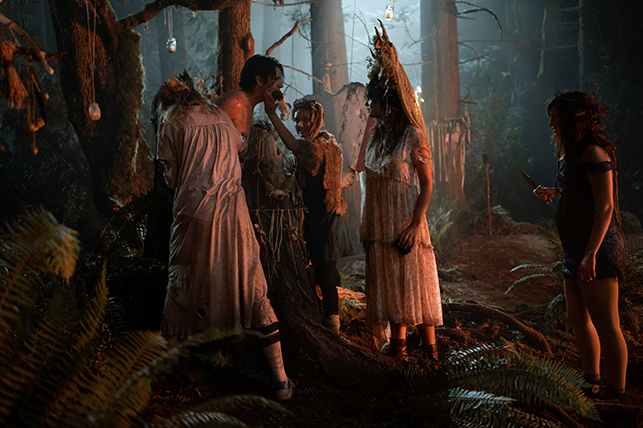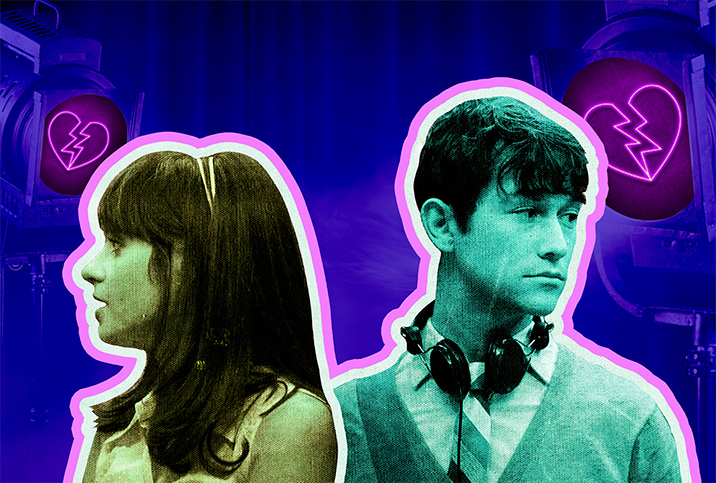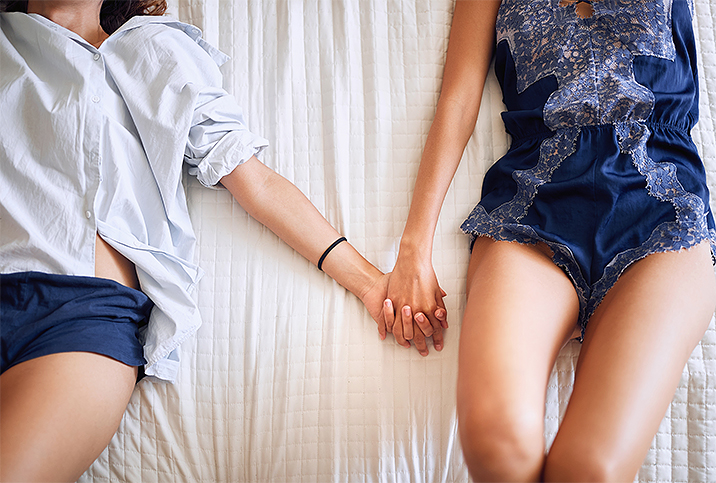'Yellowjackets': Is Coming of Age Sexually Really Like a Wilderness?

Few shows have dared to push the boundaries of the coming-of-age genre quite like "Yellowjackets," currently airing on Showtime and streaming on multiple services, including Paramount+.
The show, now in its second season, is often likened to a female-centric version of the "Lord of the Flies," the 1954 novel by Nobel prize-winning author William Golding. The action begins sometime in the 1990s when a private plane transporting a high school girls' soccer team crashes into the wilderness of Canada.
The surviving teens are left stranded for a year and a half. They find a cabin, learn to hunt, and slowly descend into a state of delirium fueled by hunger and hormones. As it progresses, we realize we are heading toward a total breakdown of social order as the girls form a pagan-esque cannibalistic cult in the woods.
Meanwhile, in the present day, the survivors continue to grapple with their traumatic time in the wilderness—and, it seems, the darkness that led them to do such awful things is still lurking in their midst.
"Yellowjackets" is a show that often leaves the viewer feeling unsettled and intrigued in equal measure, and its representation of sex is no exception. Although it doesn't take center stage, sex is an integral part of the characters' journeys.
Yellowjackets' empowering sex positivity
While the show grows darker and more twisted as it unfolds, it remains simultaneously empowering and relatable. Since its debut, "Yellowjackets" has been sex-positive and unafraid to depict complicated, unusual portrayals of sex.
"It's almost exclusively the women and girls initiating sexual relationships," said Saba Harouni Lurie, LMFT, ATR-BC, Los Angeles-based owner and founder of Take Root Therapy. "The show also embraces queer relationships, both explicitly and in more nuanced ways."
In season one, actor Melanie Lynskey's depiction of the character, Shauna, describes her as a complex, sexual woman. Not only does she have an active sex life with her husband, but we also see glimpses of her somewhat taboo sexual fantasies, which involve her daughter's boyfriend and having sex in a dead lover's art studio.
For Lynskey, her character's seemingly unorthodox sex life was something worth celebrating.
"I started to get to a point reading the script where I was like: 'Oh my God, I'm having sex again!'" Lynskey told the British newspaper, The Guardian. "Then I was like: 'How great that I'm the one who's having all the sex!' Because it happens. It's just so funny to me, this narrative that you [don't have sex after a certain age]."
The darker side of sexual fantasy
Even though many representations of sex in the show are both progressive and nuanced, they often hint at something darker. Sex, the show suggests, is rarely simply about pleasure, freedom or relationships.
As the show progressed and the girls' situation has become more dire, sex has also become a way to explore the spiritual and primal darkness within its characters.
Toward the end of the first season, the girls lean more and more into the supernatural, using a sort of pseudo-pagan spiritualism to explain the seemingly magical presence that they feel accompanies them in the wilderness.

Lottie (played by actor Courtney Eaton) emerges as their spiritual leader, and as they turn to her brand of cult-like spirituality, the characters' relationship with sex shifts, too—as it becomes a little less socially acceptable and a little more weird.
A prime example is the sex scene that takes place between Jackie (played by actor, Ella Purnell) and Travis (played by actor, Kevin Alves) during the first season finale. After accidentally getting high on mushrooms, Jackie's inhibitions are reduced, and she and Travis have sex. During the scene, Jackie appears to orgasm—something she was unable to achieve with her boyfriend before the crash.
"The thing that we talked about was the combination of the magic in the forest and the shrooms sort of creating a more tuned-in, pleasurable experience," said show creator Bart Nickerson of the scene to TVLine.
"Considering all the circumstances and the mindset that she was in, whether or not it is a genuine orgasm or her kind of tapping into a freedom that she hasn't felt before, is something that we were playing with and talking about a lot," added co-creator Ashley Lyle.
The scene is followed by an ominous group sex scene that turns dangerous, when the girls, led by Lottie, kiss and eventually hunt Travis as part of their hallucinatory trip.
A battle of faith and pragmatism
In the show's second season, as the girls continue to lose their grip on reality and the social constructs continue to break down, depictions of sex become even more primal. While having sex with Nat (Sophie Thatcher) in the cabin, Travis begins to have visions of Lottie.
"We hope that the audience doesn't necessarily interpret that, or doesn't absolutely interpret that, as a love triangle," said showrunner and writer Jonathan Lisco told The Hollywood Reporter. "It's not just like Travis is having sex with Natalie but thinking about Lottie. That's not it at all. It's actually a battle between faith and pragmatism."
"We've always talked from the very beginning about being fascinated by belief and faith and religiosity," Lyle added. "We're sort of very interested in the unexplained."
Lottie represents Travis' connection to the spiritual unknown in this scene. Just like the first season's group sex scene, which saw the girls explore both sexuality and violence during a spiritual ritual, this sex scene suggests that sex and spiritualism are intricately linked.
"He may envision Lottie as a spiritual being who is caring for him while he is having sex with Natalie, or having sex with Natalie may trigger flashbacks to his own experience of hallucinating when he was last physically intimate," Lurie explained, referencing the group sex scene. "While his relationship with Natalie seems deep and connected, he also has developed a connection with Lottie that looks different."
The powerful link between sex and spirituality
"In 'Yellowjackets,' everything is multifaceted, and that's true of sex and sexuality too," Lurie said. "Sex is connected to the group mushroom trip, is connected to dominance, is connected to vulnerability, to the relinquishing of control, and so much more."
Ultimately, the show serves as a reminder that sex is about more than relationships and physical pleasure. Rather, it's about connecting to our deepest urges: to possess, to triumph, to conquer, to win. These are the primal urges that make us human, but that are sometimes impossible to explain.
Just as all of these other urges are somehow set free in the wilderness, their sexual urges are set free, too.
"Yellowjackets" may strike you as an unusual coming-of-age show—after all, few teens go through puberty alone in a frozen Canadian forest. Nevertheless, there's something about this dark and twisted depiction of teenage sexuality and spirituality that rings true to life, at least on a metaphorical level.
Sexuality is something that's hard to define and even harder to explain—not unlike the supernatural presence in the woods in the show. Similarly, young people, particularly young women, often feel disconnected from their sexuality where they are unable to accept and express the full spectrum of light and dark that lives within until they dare to explore the wilderness inside them.
In the real world, for teenage girls at least, the coming-of-age period is often filled with darkness, weirdness and taboos. Perhaps that is why "Yellowjackets" has made such an impression. On the surface, it's a thriller-horror survival drama but at its core, it's a resonant and even radical coming-of-age tale.


















